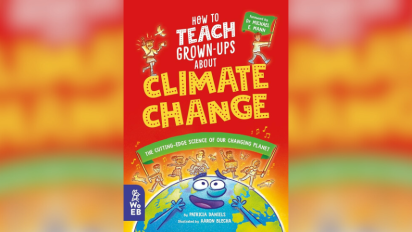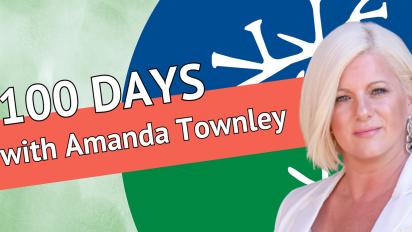[Review] How to Teach Grown-Ups About Climate Change
"How to Teach Grown-Ups about Climate Change is a welcome, and needed, corrective" to climate denial propaganda aimed at kids, writes our reviewer, Glenn Branch.
"Children can foster climate change concern among their parents.” That was the title of a 2019 paper in Nature Climate Change, one of a number of studies that provide evidence for the effectiveness of intergenerational climate change education. Patricia Daniels’s How to Teach Grown-Ups about Climate Change, aimed at readers between 8 and 12 years old, takes the ball and runs with it.
 Daniels’s book adeptly uses humor to engage the attention of its readers: black-and-white-and-green cartoons, often featuring talking animals; references to bodily functions (cow farts, cow burps, and — in a bit of a triumph — dinosaur farts); and jokey asides and digressions. Half a dozen attractive infographics on topics such as “Our Climate: A History” and “Mammals, by Biomass” occupy two-page spreads.
Daniels’s book adeptly uses humor to engage the attention of its readers: black-and-white-and-green cartoons, often featuring talking animals; references to bodily functions (cow farts, cow burps, and — in a bit of a triumph — dinosaur farts); and jokey asides and digressions. Half a dozen attractive infographics on topics such as “Our Climate: A History” and “Mammals, by Biomass” occupy two-page spreads.
The scientific content of the book, presented at a level suitable for the readership, is accurate, as might be expected from a book with a foreword by Michael E. Mann, a distinguished climate scientist and member of NCSE’s board of directors. The history of climate change science is briefly sketched, with Eunice Foote, John Tyndall, and Svante Arrhenius, but there is no discussion of later developments.
Particularly impressive is the treatment of carbon footprints. Kids are invited to consider their own carbon footprints as part of taking action on climate change, but then immediately reminded, “It’s not just individual people who have these footprints. Companies and governments also have carbon foot- prints ... Don’t let them tell you that it’s just up to you to solve climate change” (page 55).
A gap in the book’s generally admirable treatment of climate action is education. Its readers will be spending the next decade or so of their lives in formal education, so why not discuss what they could do to engage their school communities in taking action on climate change, including supporting efforts to improve curriculum and instruction?
Climate change denial propaganda campaigns aimed at schoolchildren are not new, but in 2023, no fewer than four — from the Heartland Institute, the CO2 Coalition, EverBright Media’s Kids Guides, and PragerU Kids — were in the headlines. How to Teach Grown-Ups about Climate Change is a welcome, and needed, corrective.







